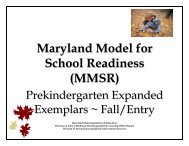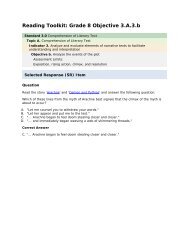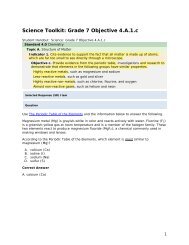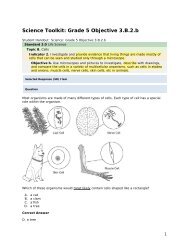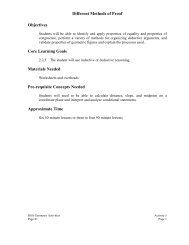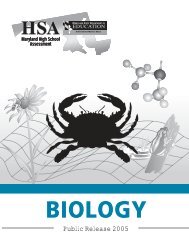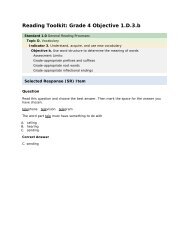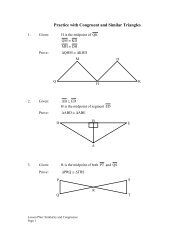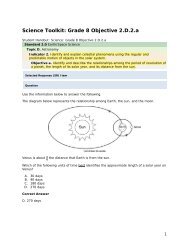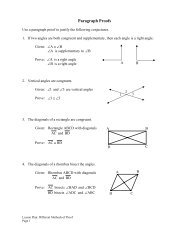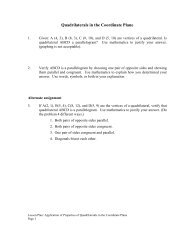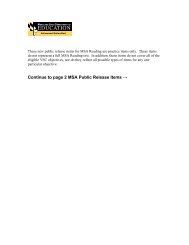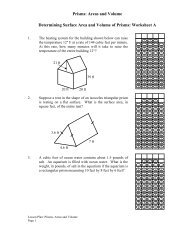Maryland common core state curriculum framework reading ... - mdk12
Maryland common core state curriculum framework reading ... - mdk12
Maryland common core state curriculum framework reading ... - mdk12
Create successful ePaper yourself
Turn your PDF publications into a flip-book with our unique Google optimized e-Paper software.
ENGLISH LANGUAGE ARTS<br />
<strong>Maryland</strong> Common Core State<br />
Curriculum Framework<br />
June 2011<br />
Reading Literature<br />
Grades 9 and 10<br />
Grades 11 and 12
<strong>Maryland</strong> Common Core State Curriculum<br />
English Language Arts<br />
In June, 2010, the <strong>Maryland</strong> State Board of Education adopted the Common Core State Standards. During the summer and fall of 2010,<br />
<strong>Maryland</strong> educators examined the Common Core State Standards and the existing State Curriculum to determine which skills and content<br />
matched the Common Core State Standards. Based on this analysis, development of the new <strong>curriculum</strong> began. These Frameworks are the<br />
result of a yearlong effort by <strong>Maryland</strong> educators to unpack the Common Core State Standards and identify the essential skills and knowledge<br />
that a student would need in order to master the grade specific standards. Since the Common Core State Standards did not include Pre‐K,<br />
<strong>Maryland</strong> educators created standards and developed the essential skills and knowledge to serve these students. The Frameworks are not<br />
intended to convey the order in which the standards should be taught nor the length of time to devote to a unit of study.<br />
Key:<br />
Black print – Common Core State Standards<br />
Red print – The Essential Skills and Knowledge identified by <strong>Maryland</strong> Educators. These <strong>state</strong>ments are intended to help teachers develop<br />
<strong>common</strong> understandings and valuable insights into what a student must know and be able to do to demonstrate proficiency with the<br />
standard.<br />
Purple print – The Common Core State Standard was judged as an excellent match with the existing State Curriculum during the gap analysis,<br />
such as SC, 6 (read “State Curriculum, Grade 6)<br />
The <strong>Maryland</strong> Common Core State Curriculum Frameworks in English Language Arts integrate standards from different strands. Throughout<br />
the <strong>Maryland</strong> Essential Skills and Knowledge, you will see references such as See CCSS 6 SL4 (read “See Common Core State Standards, Grade<br />
6, Speaking & Listening, Standard 4”). The following list shows the abbreviations used when referencing standards from the ELA Common<br />
Core State Standards:<br />
RL – Reading Literature W ‐ Writing<br />
RI – Reading Informational Text SL – Speaking and Listening<br />
RF – Reading Foundational Skills L – Language<br />
The <strong>Maryland</strong> Common Core State Curriculum Frameworks also integrate standards from the <strong>Maryland</strong> School Library Media Curriculum and<br />
the <strong>Maryland</strong> Technology Literacy Standards. These standards are indicated by the abbreviations MD SLM 6‐8 _____ (read “<strong>Maryland</strong> School<br />
Library Media, grades 6‐8, Standard, Indicator, Objective”) and TL (read “Technology Literacy Standards” followed by Standard, Indicator,<br />
Objective).<br />
MSDE.R/ELA.6/13/2011 i
Reading Standards for Literature (RL)<br />
<strong>Maryland</strong> Common Core State Curriculum<br />
English Language Arts<br />
Cluster: Key Ideas and Details<br />
RL1 CCR Anchor Standard Read closely to determine what the text says explicitly and to make logical inferences from it; cite specific textual evidence when writing or speaking to support<br />
conclusions drawn from the text.<br />
Grade 9-10 students:<br />
RL1 Cite strong and thorough textual evidence to support analysis of what the text says<br />
explicitly as well as inferences drawn from the text. (SC, 9-10)<br />
Essential Skills and Knowledge<br />
• Demonstrate the behaviors of a strategic reader.<br />
• Analyze text clues that affect meaning.<br />
• Analyze relevant denotative, connotative, and figurative language. (See 9-10 CCSS<br />
L.5)<br />
• Analyze and evaluate available evidence for thoroughness, completeness, and<br />
relevance. (See also MD SLM 4.0)<br />
• Participate actively and appropriately in discussions about literature.<br />
• Interpret, explain, and apply appropriate academic and/or domain-specific<br />
vocabulary when responding and discussing literature. (See 9-10 CCSS L.4 & L.6)<br />
• Use knowledge of language and its conventions when speaking and writing. (See 9-<br />
10 CCSS L.1)<br />
RL2 CCR Anchor Standard<br />
Determine central ideas or themes of a text and analyze their development; summarize the key supporting details and ideas.<br />
Grade 9-10 students:<br />
RL2 Determine a theme or central idea of a text and analyze in detail its development over<br />
the course of the text, including how it emerges and is shaped and refined by specific details;<br />
provide an objective summary of the text. (SC, 9-10)<br />
Essential Skills and Knowledge<br />
• Objectively summarize a text by including the appropriate details.<br />
• Analyze ideas, literary techniques, and specific details in a text that develop a<br />
theme or central idea.<br />
• Participate actively and appropriately in discussions about literature.<br />
• Interpret, explain, and apply appropriate academic and/or domain-specific<br />
vocabulary when responding and discussing literature. (See 9-10 CCSS L.4 & L.6)<br />
• Use knowledge of language and its conventions when speaking and writing. (See 9-<br />
10 CCSS L.1)<br />
Grade 11-12 students:<br />
RL1 Cite strong and thorough textual evidence to support analysis of what the text says<br />
explicitly as well as inferences drawn from the text, including determining where the text<br />
leaves matters uncertain. (SC, 11-12)<br />
Essential Skills and Knowledge<br />
• Demonstrate the behaviors of a strategic reader.<br />
• Analyze text clues that affect meaning.<br />
• Analyze relevant denotative, connotative, and figurative language. (See 11-12<br />
CCSS L.5)<br />
• Analyze and evaluate available evidence for thoroughness, completeness, and<br />
relevance. (See also MD SLM 4.0)<br />
• Explain and analyze complexities and ambiguities in a work of literature.<br />
• Participate actively and appropriately in discussions about literature.<br />
• Interpret, explain, and apply appropriate academic and/or domain-specific<br />
vocabulary when responding and discussing literature. (See 11-12 CCSS L.4 & L.6)<br />
• Use knowledge of language and its conventions when speaking and writing. (See<br />
11-12 CCSS L.1)<br />
Grade 11-12 students:<br />
RL2 Determine two or more themes or central ideas of a text and analyze their development<br />
over the course of the text, including how they interact and build on one another to produce<br />
a complex account; provide an objective summary of the text. (SC, 11-12)<br />
Essential Skills and Knowledge<br />
• Objectively summarize a text by including the appropriate details.<br />
• Analyze ideas, literary techniques, and specific details in a text that develop multiple<br />
themes or central ideas.<br />
• Analyze how multiple themes interact in a text and explain how they clarify and<br />
extend meaning.<br />
• Participate actively and appropriately in discussions about literature.<br />
• Interpret, explain, and apply appropriate academic and/or domain-specific<br />
vocabulary when responding and discussing literature. (See 11-12 CCSS L.4 & L.6)<br />
• Use knowledge of language and its conventions when speaking and writing. (See<br />
11-12 CCSS L.1)<br />
MSDE.R/ELA.6/13/2011 1
Reading Standards for Literature (RL)<br />
<strong>Maryland</strong> Common Core State Curriculum<br />
English Language Arts<br />
Cluster: Key Ideas and Details<br />
RL3 CCR Anchor Standard Analyze how and why individuals, events, and ideas develop and interact over the course of a text.<br />
Grade 9-10 students:<br />
RL3 Analyze how complex characters (e.g., those with multiple or conflicting motivations)<br />
develop over the course of a text, interact with other characters, and advance the plot or<br />
develop the theme. (SC, 9-10)<br />
Essential Skills and Knowledge<br />
• Analyze and explain how complex characters develop, interact, and change over<br />
the course of a text.<br />
• Analyze, explain, and evaluate the impact of complex characters on advancing the<br />
plot and developing the theme in a text.<br />
• Participate actively and appropriately in discussions about literature.<br />
• Interpret, explain, and apply appropriate academic and/or domain-specific<br />
vocabulary when responding and discussing literature. (See 9-10 CCSS L.4 & L.6)<br />
• Use knowledge of language and its conventions when speaking and writing. (See 9-<br />
10 CCSS L.1)<br />
Grade 11-12 students:<br />
RL3 Analyze the impact of the author’s choices regarding how to develop and relate elements<br />
of a story or drama (e.g., where a story is set, how the action is ordered, how the characters<br />
are introduced and developed). (SC, 11-12)<br />
Essential Skills and Knowledge<br />
• Demonstrate an understanding that an author deliberately makes choices that<br />
develop the narrative elements.<br />
• Analyze and explain how an author’s choices impact the development and<br />
interaction of the narrative elements in a specific text.<br />
• Participate actively and appropriately in discussions about literature.<br />
• Interpret, explain, and apply appropriate academic and/or domain-specific<br />
vocabulary when responding and discussing literature. (See 11-12 CCSS L.4 & L.6)<br />
• Use knowledge of language and its conventions when speaking and writing. (See<br />
11-12 CCSS L.1)<br />
Cluster: Craft and Structure<br />
RL4 CCR Anchor Standard Interpret words and phrases as they are used in a text, including determining technical, connotative, and figurative meanings, and analyze how specific word<br />
choices shape meaning or tone.<br />
Grade 9-10 students:<br />
RL4 Determine the meaning of words and phrases as they are used in the text, including<br />
figurative and connotative meanings; analyze the cumulative impact of specific word choices<br />
on meaning and tone (e.g., how the language evokes a sense of time and place; how it sets a<br />
formal or informal tone.) (SC, 9-10)<br />
Essential Skills and Knowledge<br />
• Analyze the meaning, use, and effect of connotations, colloquialisms, idioms, and<br />
figurative language. (See 9-10 CCSS L.5)<br />
• Analyze and explain how an author uses techniques to establish and maintain a<br />
specific literary style and tone.<br />
• Analyze and explain the cumulative impact of an author's deliberate manipulation of<br />
language (word choice, diction, structure) on meaning and tone.<br />
• Participate actively and appropriately in discussions about literature.<br />
• Interpret, explain, and apply appropriate academic and/or domain-specific<br />
vocabulary when responding and discussing literature. (See 9-10 CCSS L.4 & L.6)<br />
• Use knowledge of language and its conventions when speaking and writing. (See 9-<br />
10 CCSS L.1)<br />
Grade 11-12 students:<br />
RL4 Determine the meaning of words and phrases as they are used in the text, including<br />
figurative and connotative meanings; analyze the impact of specific word choices on meaning<br />
and tone, including words with multiple meanings or language that is particularly fresh,<br />
engaging, or beautiful. (Include Shakespeare as well as other authors.) (SC, 11-12)<br />
Essential Skills and Knowledge<br />
• Analyze the meaning, use, and effect of connotations, multiple meanings,<br />
colloquialisms, idioms, and figurative language. (See 11-12 CCSS L.5)<br />
• Analyze and explain how an author uses techniques to establish and maintain a<br />
specific literary style and tone.<br />
• Analyze, explain, and evaluate the cumulative impact of an author’s deliberate<br />
manipulation of language (word choice, diction, structure) on meaning, imagery,<br />
mood, and tone.<br />
• Participate actively and appropriately in discussions about literature.<br />
• Interpret, explain, and apply appropriate academic and/or domain-specific<br />
vocabulary when responding and discussing literature. (See 11-12 CCSS L.4 & L.6)<br />
• Use knowledge of language and its conventions when speaking and writing. (See<br />
11-12 CCSS L.1)<br />
MSDE.R/ELA.6/13/2011 2
Reading Standards for Literature (RL)<br />
<strong>Maryland</strong> Common Core State Curriculum<br />
English Language Arts<br />
Cluster: Craft and Structure<br />
RL5 CCR Anchor Standard Analyze the structure of texts, including how specific sentences, paragraphs, and larger portions of the text (e.g., a section, chapter, scene, or stanza) relate to<br />
each other and the whole.<br />
Grade 9-10 students:<br />
RL5 Analyze how an author’s choices concerning how to structure a text, order events<br />
within it (e.g., parallel plots), and manipulate time (e.g., pacing, flashbacks) create such<br />
effects as mystery, tension, or surprise. (SC, 9-10)<br />
Essential Skills and Knowledge<br />
• Identify and explain the structural characteristics of complex narrative texts and use<br />
those characteristics when interpreting texts.<br />
• Analyze and explain how an author deliberately manipulates text structures, orders<br />
events, and the uses elements of time to create a specific effect and mood.<br />
• Participate actively and appropriately in discussions about literature.<br />
• Interpret, explain, and apply appropriate academic and/or domain-specific<br />
vocabulary when responding and discussing literature. (See 9-10 CCSS L.4 & L.6)<br />
• Use knowledge of language and its conventions when speaking and writing. (See 9-<br />
10 CCSS L.1)<br />
Grade 11-12 students:<br />
RL5 Analyze how an author’s choices concerning how to structure specific parts of a text (e.g., the<br />
choice of where to begin or end a story, the choice to provide a comedic or tragic resolution)<br />
contribute to its overall structure and meaning as well as its aesthetic impact. (SC, 11-12)<br />
Essential Skills and Knowledge<br />
• Explain, analyze, and evaluate the structural characteristics complex narrative texts and use<br />
those characteristics when interpreting texts.<br />
• Analyze and explain how an author’s deliberate manipulation of the internal structures of a<br />
text contributes to its overall structure, meaning, and effect.<br />
o<br />
Analyze the effect of an author’s:<br />
• decision on where to begin and/or end a story<br />
• choice of a comedic or tragic resolution<br />
• Participate actively and appropriately in discussions about literature.<br />
• Interpret, explain, and apply appropriate academic and/or domain-specific vocabulary when<br />
responding and discussing literature. (See 11-12 CCSS L.4 & L.6)<br />
• Use knowledge of language and its conventions when speaking and writing. (See 11-12<br />
CCSS L.1)<br />
RL6 CCR Anchor Standard Assess how point of view or purpose shapes the content and style of a text.<br />
Grade 9-10 students:<br />
Grade 11-12 students:<br />
RL6 Analyze a particular point of view or cultural experience reflected in a work of RL6 Analyze a case in which grasping point of view requires distinguishing what is directly <strong>state</strong>d<br />
literature from outside the United States, drawing on a wide <strong>reading</strong> of world literature. in a text from what is really meant (e.g., satire, sarcasm, irony, or under<strong>state</strong>ment).<br />
Essential Skills and Knowledge<br />
Essential Skills and Knowledge<br />
• Understand, appreciate, and make connections with different cultures and points of • Analyze and evaluate the appropriateness of a specific tone and/or shift in tone for a<br />
view.<br />
particular purpose, character, speaker, or situation.<br />
• Identify, analyze and explain the influence, effect, or impact of historical and/or • Analyze, and explain the implied meaning of the text.<br />
cultural experience on narrative text.<br />
• Distinguish among types of irony (e.g., verbal, situational, dramatic).<br />
• Analyze the significance and effect of the author’s point of view and biographical • Analyze and evaluate the overall effect of the use of irony and its impact on achieving the<br />
experiences on narrative text.<br />
author’s purpose.<br />
• Participate actively and appropriately in discussions about literature.<br />
• Analyze the characteristics of particular literary subgenres (e.g., satire, farce, sarcasm,<br />
• Interpret, explain, and apply appropriate academic and/or domain-specific<br />
under<strong>state</strong>ment, parody, allegory) as they create meaning and achieve the author’s purpose.<br />
vocabulary when responding and discussing literature. (See 9-10 CCSS L.4 & L.6) • Participate actively and appropriately in discussions about literature.<br />
• Use knowledge of language and its conventions when speaking and writing. (See 9- • Interpret, explain, and apply appropriate academic and/or domain-specific vocabulary when<br />
10 CCSS L.1)<br />
responding and discussing literature. (See 11-12 CCSS L.4 & L.6)<br />
• Use knowledge of language and its conventions when speaking and writing. (See CCSS L.1)<br />
MSDE.R/ELA.6/13/2011 3
Reading Standards for Literature (RL)<br />
<strong>Maryland</strong> Common Core State Curriculum<br />
English Language Arts<br />
Cluster: Integration of Knowledge and Ideas<br />
RL7 CCR Anchor Standard Integrate and evaluate content presented in diverse formats and media, including visually and quantitatively, as well as in words.<br />
Grade 9-10 students:<br />
Grade 11-12 students:<br />
RL7 Analyze the representation of a subject or a key scene in two different artistic mediums,<br />
including what is emphasized or absent in each treatment (e.g., Auden’s “Musée des Beaux<br />
Arts” and Breughel’s Landscape with the Fall of Icarus). (SC, 9-10)<br />
RL7 Analyze multiple interpretations of a story, drama, or poem (e.g., recorded or live<br />
production of a play or recorded novel or poetry), evaluating how each version interprets the<br />
source text. (Include at least one play by Shakespeare and one play by an American<br />
dramatist.)<br />
Essential Skills and Knowledge<br />
Essential Skills and Knowledge<br />
• Demonstrate the behaviors of a strategic reader, listener, or viewer of a variety of<br />
literary forms.<br />
• Demonstrate the behaviors of a strategic reader, listener, or viewer of a variety of<br />
literary forms.<br />
• Compare and contrast significant ideas between two different artistic mediums. • Compare and contrast significant ideas between multiple interpretations of the<br />
• Analyze and evaluate the author’s choice of details to include and exclude in order<br />
source text.<br />
to convey meaning in print and non-print text.<br />
• Analyze and evaluate the effectiveness of an author’s interpretation of themes or<br />
• Analyze and evaluate the effectiveness of organization and structure in order to<br />
central ideas found in different versions of a story, drama, or poem.<br />
accomplish a purpose in print and non-print text. (See also MD SLM 3.0)<br />
• Analyze and evaluate the effectiveness of organization and structure in order to<br />
• Participate actively and appropriately in discussions about literature.<br />
accomplish a purpose in multiple interpretations of a story, drama or poem. (See<br />
• Interpret, explain, and apply appropriate academic and/or domain-specific<br />
also MD SLM 3.0)<br />
vocabulary when responding and discussing literature. (See 9-10 CCSS L.4 & L.6) • Participate actively and appropriately in discussions about literature.<br />
• Use knowledge of language and its conventions when speaking and writing. (See 9-<br />
10 CCSS L.1)<br />
• Interpret, explain, and apply appropriate academic and/or domain-specific<br />
vocabulary when responding and discussing literature. (See 11-12 CCSS L.4 &<br />
L.6)<br />
• Use knowledge of language and its conventions when speaking and writing. (See<br />
11-12 CCSS L.1)<br />
RL8 CCR Anchor Standard Delineate and evaluate the argument and specific claims in a text, including the validity of the reasoning as well as the relevance and sufficiency of the<br />
evidence.<br />
Grade 9-10 students:<br />
Grade 11-12 students:<br />
RL8 Not applicable to literature<br />
RL8 Not applicable to literature<br />
MSDE.R/ELA.6/13/2011 4
Reading Standards for Literature (RL)<br />
<strong>Maryland</strong> Common Core State Curriculum<br />
English Language Arts<br />
Cluster: Integration of Knowledge and Ideas<br />
RL9 CCR Anchor Standard Analyze how two or more texts address similar themes or topics in order to build knowledge or to compare the approaches the authors take.<br />
Grade 9-10 students:<br />
Grade 11-12 students:<br />
RL9 Analyze how an author draws on and transforms source material in a specific work (e.g.,<br />
how Shakespeare treats a theme or topic from Ovid or the Bible or how a later author draws<br />
on a play by Shakespeare).<br />
RL9 Demonstrate knowledge of eighteenth-, nineteenth- and early-twentieth-century<br />
foundational works of American literature, including how two or more texts from the same<br />
period treat similar themes or topics.<br />
Essential Skills and Knowledge<br />
Essential Skills and Knowledge<br />
• Demonstrate understanding of why certain literary themes transcend time.<br />
• Analyze and explain themes <strong>common</strong> to specific time periods in American history.<br />
• Analyze specific universal themes of the human condition and how they are<br />
transformed by different authors.<br />
• Analyze and evaluate the impact of historical and/or cultural experiences on literary<br />
themes or topics.<br />
• Participate actively and appropriately in discussions about literature.<br />
• Interpret, explain, and apply appropriate academic and/or domain-specific vocabulary<br />
• Compare and contrast the treatment of similar themes or topics by two or more<br />
authors of the same time period.<br />
when responding and discussing literature. (See 9-10 CCSS L.4 & L.6)<br />
• Participate actively and appropriately in discussions about literature.<br />
• Use knowledge of language and its conventions when speaking and writing. (See 9-10<br />
CCSS L.1)<br />
• Interpret, explain, and apply appropriate academic and/or domain-specific<br />
vocabulary when responding and discussing literature. (See 11-12 CCSS L.4 & L.6)<br />
• Use knowledge of language and its conventions when speaking and writing. (See<br />
11-12 CCSS L.1)<br />
RL10 CCR Anchor Standard Read and comprehend complex literary and informational texts independently and proficiently.<br />
Grade 9-10 students:<br />
Grade 11-12 students:<br />
RL10<br />
By the end of grade 9, read and comprehend literature, including stories, dramas, and poems,<br />
in the grades 9-10 text complexity band proficiently, with scaffolding as needed at the high<br />
end of the range.<br />
By the end of grade 10, read and comprehend literature, including stories dramas, and<br />
poems, at the end of the grades 9-10 text complexity band independently and proficiently.<br />
RL10<br />
By the end of grade 11, read and comprehend literature, including stories, dramas, and<br />
poems, in the grades 11-CCR text complexity band proficiently, with scaffolding as needed at<br />
the high end of the range.<br />
By the end of grade 12, read and comprehend literature, including stories dramas, and poems,<br />
at the high end of the grades 11-CCR text complexity band independently and proficiently.<br />
Essential Skills and Knowledge<br />
Essential Skills and Knowledge<br />
• Demonstrate understanding of a wide range of sufficiently complex literary texts<br />
representing diverse cultures, perspectives, ethnicities, and time periods. (See also<br />
MD SLM 6.0)<br />
o Comprehend texts of steadily increasing complexity, with scaffolding as needed.<br />
o As an emerging adult reader, set personal <strong>reading</strong> goals to self select and<br />
explore texts of different genres and increasing complexity.<br />
• Participate actively and appropriately in discussions about literature.<br />
• Interpret, explain, and apply appropriate academic and/or domain-specific vocabulary<br />
when responding and discussing literature. (See 9-10 CCSS L.4 & L.6)<br />
• Use knowledge of language and its conventions when speaking and writing. (See 9-10<br />
CCSS L.1)<br />
• Demonstrate understanding of a wide range of sufficiently complex literary texts<br />
representing diverse cultures, perspectives, ethnicities, and time periods. (See also<br />
MD SLM 6.0)<br />
o<br />
o<br />
Comprehend texts of steadily increasing complexity.<br />
As an emerging adult reader, set personal <strong>reading</strong> goals to self select and<br />
explore texts of different genres and increasing complexity.<br />
• Participate actively and appropriately in discussions about literature.<br />
• Interpret, explain, and apply appropriate academic and/or domain-specific<br />
vocabulary when responding and discussing literature. (See 9-10 CCSS L.4 & L.6)<br />
• Use knowledge of language and its conventions when speaking and writing. (See 9-<br />
10 CCSS L.1)<br />
MSDE.R/ELA.6/13/2011 5



